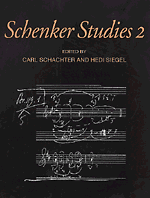Book contents
- Frontmatter
- Contents
- Abbreviated references to Schenker's writings
- Preface
- ARCHIVAL STUDIES
- Levels of understanding: an introduction to Schenker's Nachlass
- When “Freier Satz” was part of Kontrapunkt: a preliminary report
- Schenker's unpublished work with the music of Johannes Brahms
- ANALYTICAL STUDIES
- Index
Schenker's unpublished work with the music of Johannes Brahms
Published online by Cambridge University Press: 12 January 2010
- Frontmatter
- Contents
- Abbreviated references to Schenker's writings
- Preface
- ARCHIVAL STUDIES
- Levels of understanding: an introduction to Schenker's Nachlass
- When “Freier Satz” was part of Kontrapunkt: a preliminary report
- Schenker's unpublished work with the music of Johannes Brahms
- ANALYTICAL STUDIES
- Index
Summary
It is not known how Heinrich Schenker first met Johannes Brahms. Certainly by 1894 the two men had established an acquaintance that afforded Schenker various opportunities to visit with Brahms. Schenker once described the nature of this association:
Nothing is farther from my intent than to represent myself as a surviving friend of Brahms. The very significant age difference, my great reverence and love for the master, concern for his time [– these] allowed me to approach him only when I had a serious request, such as arose for a variety of reasons: sometimes it was my compositions, published or unpublished, that took me to him, sometimes [my] reviews of his newly published works or other essays of mine, [sometimes] conveying or commending the requests of others.
These meetings made a profound and lasting impression on Schenker, whose admiration and respect for Brahms increased as he pursued his musical studies; in later years, Schenker often referred to him as “the last great master of German music”. It has even been suggested that Brahms's influence on Schenker was, in a way, the inspiration for his theoretical achievements.
Curiously, however, Schenker's publications do not contain many analyses of Brahms's music. Although Schenker frequently used brief excerpts as examples, he published only one analysis of a complete work – a substantial essay on the Handel Variations, Op. 24. This apparent neglect of Brahms's music is somewhat inconsistent with the notion that the composer had been a formative influence on Schenker and his work.
- Type
- Chapter
- Information
- Schenker Studies 2 , pp. 26 - 46Publisher: Cambridge University PressPrint publication year: 1999
- 3
- Cited by

